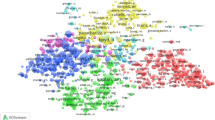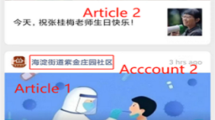Abstract
The increasingly serious problem of ecological environmental pollution warns the importance of human environmental protection behavior. However, public attention to environmental protection plays an important role in solving environmental problems. Therefore, in order to explore the environmental concerns of Chinese residents, the trends in time and space, the relationship between online retweets, and the extraction of environmental concerns, this study analyzed the data of Sina Weibo users and their comments on related posts. At the same time, we used the text mining analysis method to analyze the social media text data, and the results are as follows. In that analysis of concern about environmental protection, women show a stronger attitude and willingness to protect the environment than men, and the public in economically developed areas is more concerned. In order to further investigate the public’s environmental concerns, this study also utilized the PageRank algorithm to further study the forwarding relationships between users. The study found that celebrities and some good media organizations can attract environmental attention. Finally, we use pyLDAvis technology to visualize and analyze popular environmental themes and propose reasonable countermeasures and suggestions to enhance public environmental awareness based on the research results.















Similar content being viewed by others
Data availability
All data generated or analyzed during this study are included in this published article and its supplementary information files.
References
Adrita UW, Mohiuddin MF (2020) Impact of opportunity and ability to translate environmental attitude into ecologically conscious consumer behavior. J Mark Theory Pract 28:173–186
Ajzen I (1991) The theory of planned behavior. Organ Behav Hum Decis Process 50:179–211
Anderson A (2011) Sources, media, and modes of climate change communication: the role of celebrities. Wiley Interdisc Rev Clim Change 2(4):535–546. https://doi.org/10.1002/wcc.119
Armitage D, De Loë R, Plummer R (2012) Environmental governance and its implications for conservation practice. Conserv Lett 5(4):245–255. https://doi.org/10.1111/j.1755-263X.2012.00238.x
Axsen J, Orlebar CN, Skippon SM (2013) Social influence and consumer preference formation for pro-environmental technology: the case of a U.K. workplace electric-vehicle study. Ecol Econ 95:96–107
Blei DM, Ng A, Jordan MI (2001) Latent Dirichlet allocation. J Mach Learn Res 3:993–1022
Borghini S, Sherry JF, Joy A (2021) Attachment to and detachment from favorite stores: an affordance theory perspective. J Consum Res 47(6):890–913. https://doi.org/10.1093/jcr/ucaa044
Brieger SA (2019) Social identity and environmental concern: the importance of contextual effects. Environ Behav 51:828–855
Casaló LV, Escario JJ (2018) Heterogeneity in the association between environmental attitudes and pro-environmental behavior: a multilevel regression approach. J Clean Prod 175:155–163
Cespedes-Dominguez C, Fernández-Robin C, McCoy S (2021) The effects of celebrity characteristics on purchase intentions: a focus on consumer concern of environmental issues. Sustainability 13:4083
Chaturvedi P, Kulshreshtha K, Tripathi V (2022) Investigating the role of celebrity institutional entrepreneur in reducing the attitude-behavior gap in sustainable consumption. Manag Environ Qual 33(3):625–643. https://doi.org/10.1108/MEQ-09-2021-0226
Chen M, Zhang WH (2021) Purchase intention for hydrogen automobile among Chinese citizens: the influence of environmental concern and perceived social value. Int J Hydro Energy 46(34):18000–18010. https://doi.org/10.1016/j.ijhydene.2020.11.099
Chen L, Hu N, Shu C, Chen X (2019) Adult attachment and self-disclosure on social networking site: a content analysis of Sina Weibo. Personal Indiv Differ 138:96–105. https://doi.org/10.1016/j.paid.2018.09.028
Chen Q, Min C, Zhang W, Wang G, Ma X, Evans RD (2020) Unpacking the black box: how to promote citizen engagement through government social media during the COVID-19 crisis. Comput Hum Behav 110:106380–106380
Chen CF, Eccarius T, Su PC (2021) The role of environmental concern in forming intentions for switching to electric scooters. Transport Res Part A Policy Pract 154:129–144. https://doi.org/10.1016/j.tra.2021.10.010
Ding Q, Cai W, Wang C, Sanwal M (2017) “The relationships between household consumption activities and energy consumption in china— an input-output analysis from the lifestyle perspective. Appl Energy 207:520–532
Dunlap RE, Liere KDV, Mertig AG, Jones RE (2000) New trends in measuring environmental attitudes: measuring endorsement of the new ecological paradigm: a revised NEP scale. J Soc Issues 56:425–442
Fransson N, Gärling T (1999) Environmental concern: conceptual definitions, measurement methods, and research findings. J Environ Psychol 19:369–382
Gan C (2018) Gratifications for using social media. Inf Dev 34:139–147
Gifford R, Nilsson A (2014) Personal and social factors that influence pro-environmental concern and behaviour: a review. Int J Psychol 49(3):141–157
Guerreiro J, Rita P (2020) How to predict explicit recommendations in online reviews using text mining and sentiment analysis. J Hosp Tour Manag 43:269–272. https://doi.org/10.1016/j.jhtm.2019.07.001
Ham CD, Lee J, Hayes JL, Bae YH (2018) Exploring sharing behaviors across social media platforms. Int J Mark Res 61:157–177
Han F, Xie R, Lu Y, Fang J, Liu Y (2018) The effects of urban agglomeration economies on carbon emissions: evidence from Chinese cities. J Clean Prod 172:1096–1110
Hansen MH, Li H, Svarverud R (2018) Ecological civilization: interpreting the Chinese past, projecting the global future. Global Environ Change 53:195–203. https://doi.org/10.1016/j.gloenvcha.2018.09.014
Hunter LM, Hatch A, Johnson A (2004) Cross‐national gender variation in environmental behaviors. Soc Sci Q 85:677–694
Kaiser FG, Scheuthle H (2003) Two challenges to a moral extension of the theory of planned behavior: moral norms and just world beliefs in conservationism. Personal Individ Differ 35:1033–1048
Kanagy CL, Humphrey CR, Firebaugh G (1994) Surging environmentalism: changing public opinion or changing publics? Soc Sci Q 75:804–819
Kaplan AM, Haenlein M (2010) Users of the world, unite! The challenges and opportunities of Social Media. Bus Horiz 53:59–68
Kim M, Kim J (2020) How does a celebrity make fans happy? Interaction between celebrities and fans in the social media context. Comput Hum Behav 111:106419
Kim Y-M, Delen D (2018) Medical informatics research trend analysis: a text mining approach. Health Informatics J 24:432–452
Kong SC, Kwok WY, Poon C-W (2021) Evaluating a learning trail for academic integrity development in higher education using bilingual text mining. Technol Pedagog Educ 30:305–322
Landry N, Gifford R, Milfont TL, Weeks ACW, Arnocky S (2018) Learned helplessness moderates the relationship between environmental concern and behavior. J Environ Psychol 55:18–22
Liu X, Mu R (2016) Public environmental concern in China: determinants and variations. Global Environ Change-Hum Policy Dimens 37:116–127
Ngai EWT, Tao SSC, Moon KK-L (2015) Social media research: theories, constructs, and conceptual frameworks. Int J Inf Manag 35:33–44
Pejić Bach M, Krstić Ž, Seljan S, Turulja L (2019) Text mining for big data analysis in financial sector: a literature review. Sustainability 11(5):1277. https://doi.org/10.3390/su11051277
Scherer L, Behrens P, de Koning A, Heijungs R, Sprecher B, Tukker A (2018) Trade-offs between social and environmental sustainable development goals. Environmental Science & Policy
Schultz PW (2001) The structure of environmental concern: concern for self, other people, and the biosphere. J Environ Psychol 21:327–339
Shan S, Peng J, Wei Y (2020) Environmental Sustainability assessment 2.0: the value of social media data for determining the emotional responses of people to river pollution—A case study of Weibo (Chinese Twitter). Socio-Econ Plan Sci 100868. https://doi.org/10.1016/j.seps.2020.100868
Sharifi A (2020) Co-benefits and synergies between urban climate change mitigation and adaptation measures: a literature review. Sci Total Environ 750:141642
Sterrett D, Malato D, Benz JK, Kantor L, Tompson T, Rosenstiel T, Sonderman J, Loker K (2019) Who shared it?: deciding what news to trust on social media. Digit Journal 7:783–801
Strapko N, Hempel LM, MacIlroy K, Smith KD (2016) Gender differences in environmental concern: reevaluating gender socialization. Soc Nat Resour 29:1015–1031
Suárez-Eiroa B, Fernández E, Méndez-Martínez G, Soto-Oñate D (2019) Operational principles of circular economy for sustainable development: linking theory and practice. J Clean Prod 214:952–961. https://doi.org/10.1016/j.jclepro.2018.12.271
Sun Y, Liu N, Zhao M (2019) Factors and mechanisms affecting green consumption in China: a multilevel analysis. J Clean Prod 209:481–493. https://doi.org/10.1016/j.jclepro.2018.10.241
Tian H, Zhang J, Li J (2019) The relationship between pro-environmental attitude and employee green behavior: the role of motivational states and green work climate perceptions. Environ Sci Pollut Res 27:7341–7352
Wang A, Hu S, Lin B (2021) Can environmental regulation solve pollution problems? Theoretical model and empirical research based on the skill premium. Energy Econ 94:105068. https://doi.org/10.1016/j.eneco.2020.105068
Wu B, Yang Z (2018) The impact of moral identity on consumers’ green consumption tendency: the role of perceived responsibility for environmental damage. J Environ Psychol 59:74–84. https://doi.org/10.1016/j.jenvp.2018.08.011
Wu Z, Zhang Y, Chen Q, Wang H (2021) Attitude of Chinese public towards municipal solid waste sorting policy: a text mining study. Sci Total Environ 756:142674. https://doi.org/10.1016/j.scitotenv.2020.142674
Yang YS, Zhang H, Tu G, Li W, Tang S, Xu Q (2014) Study on the development strategies of China’s new energy vehicles. Manag Technol 20:160–161
Zafar AU, Qiu J, Li Y, Wang J, Shahzad M (2021) The impact of social media celebrities' posts and contextual interactions on impulse buying in social commerce. Comput Hum Behav 115:106178
Zhang W, Luo B (2021) Do environmental concern and perceived risk contribute to consumers' intention toward buying remanufactured products? An empirical study from China. Clean Techn Environ Policy 23:463–474
Zhang F, Fleyeh H, Wang X, Lu M (2019) Construction site accident analysis using text mining and natural language processing techniques. Autom Construct 99:238–248. https://doi.org/10.1016/j.autcon.2018.12.016
Zhang TC, Li B, Hua N (2021) Chinese cultural theme parks: text mining and sentiment analysis. J Tour Cult Chang 20:37–57
Zhang H, Feng C, Zhou X (2022) Going carbon-neutral in China: does the low-carbon city pilot policy improve carbon emission efficiency? Sustain Prod Consumpt 33:312–329. https://doi.org/10.1016/j.spc.2022.07.002
Acknowledgements
We are very grateful to Professor Yang. He gave me a lot of useful and constructive suggestions in my thesis. His professional and academic knowledge taught me how to do research. In addition, I would like to thank all the authors for their helpful discussion.
Funding
This research was funded by the Anhui Provincial Philosophy and Social Science Planning General Program, grant number AHSKY 2017 D70; the Undergraduate Quality Engineering Anhui Province Key Teaching and Research Project, grant number 2020JYXM1410; and the National College Student Innovation Training Program, grant number 202110371025, 202210371007, G02210371007.
Author information
Authors and Affiliations
Contributions
Conceptualization and formal analysis: Guangxia Li and Lifeng Yang; methodology: Yunyun Yuan and Shaotong Wu; software analysis and the writing—original draft preparation: Guangxia Li; validation: Guangxia Li and Shaotong Wu; investigation: Lifeng Yang and Shaotong Wu; writing—review and editing: Guangxia Li, Lifeng Yang and Yunyun Yuan; supervision: Yunyun Yuan; project administration and funding acquisition: Lifeng Yang. All authors have read and agreed on the final version of the manuscript.
Corresponding author
Ethics declarations
Ethics approval and consent to participate
Not applicable.
Consent for publication
Not applicable.
Competing interests
The authors declare no competing interests.
Additional information
Responsible Editor: Philippe Garrigues
Publisher’s Note
Springer Nature remains neutral with regard to jurisdictional claims in published maps and institutional affiliations.
Rights and permissions
Springer Nature or its licensor (e.g. a society or other partner) holds exclusive rights to this article under a publishing agreement with the author(s) or other rightsholder(s); author self-archiving of the accepted manuscript version of this article is solely governed by the terms of such publishing agreement and applicable law.
About this article
Cite this article
Yang, ., Wu, S., Li, G. et al. Explore public concerns about environmental protection on Sina Weibo: evidence from text mining. Environ Sci Pollut Res 30, 104067–104085 (2023). https://doi.org/10.1007/s11356-023-29757-2
Received:
Accepted:
Published:
Issue Date:
DOI: https://doi.org/10.1007/s11356-023-29757-2




